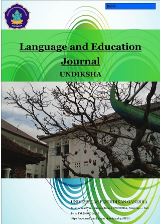THE IMPACT OF INFOGRAPHICS IN AN ONLINE JIGSAW SETTING TOWARDS INDONESIAN EFL LEARNERS’ READING COMPREHENSION
DOI:
https://doi.org/10.23887/leju.v4i1.32239Keywords:
Infographic, online jigsaw, reading comprehension, Indonesian EFL.Abstract
This study aimed to investigate the impact of infographics in online Jigsaw setting towards Indonesian EFL senior high school students’ reading comprehension. The research was a pre-experimental study with one group pretest-posttest design. The sample was one class of intact groups from tenth graders which was randomly assigned by English teacher in SMA Negeri 1 Singaraja. The data collection employed pre-test-posttest and were analyzed descriptively and inferentially through IBM SPSS Statistics 23. The results show that (1) the students’ posttest mean was 88.38 which was higher than the pretest that was 65.00; and (2) there was a significant difference between the posttest mean and that pretest mean Sig. (two-tailed) was 0.000, which was < 0.05. Therefore, it could be concluded that infographics in an online Jigsaw setting had a positive and significant impact towards Indonesian EFL’s reading comprehension.
References
Aronson, E. (2002). Building empathy, compassion, and achievement in the jigsaw classroom. Improving Academic Achievement, 209–225. https://doi.org/10.1016/b978-012064455-1/50013-0
Broek, P., & Espin, C. A. (2012). Connecting cognitive theory and assessment: Measuring individual differences in reading comprehension. School Psychology Review, 41(3), 315-325
Cupita, L. A. L., & Franco, L. M. P. (2019). The use of infographics to enhance reading comprehension skills among learners. Colombian Applied Linguistics Journal, 21(2), 230–242. https://doi.org/10.14483/22487085.12963
Davis, M., & Quinn, D. (2014). Visualizing text: the new literacy of infographics. Reading Today, 31(3), 16–18. http://search.ebscohost.com/login.aspx?direct=true&db=aph&AN=93288599&site=ehost-live&scope=site
Ertem, I. S. (2010). The effect of electronic storybooks on struggling fourthgraders’ reading comprehension. Turkish Online Journal of Educational Technology, 9(4), 140–155.
Gay, I. R., Mills, E. G., & Airasian, P. W. (2012). Research method: Competencies for analysis and applications. Boston, MA: Pearson Education
Kagan, S., & Kagan, M. (2009). Why do we need cooperative learning?. CA: USA, Kagan Publishing
Kongwat, A., & Sukavatee, P. (2019). The effects of collaborative reading instruction using infographics on students’ reading comprehension. An Online Journal of Education, 14(2), 1–12.
Márquez, L. M. T., Llinás, J. G., & Macías, F. S. (2017). Collaborative learning: use of the jigsaw technique in mapping concepts of physics. Problems of Education in the 21st Century, 75(1), 92–101.
Mengduo, Q., & Xiaoling, J. (2010). Jigsaw strategy as a cooperative learning technique: focusing on the language learners. Chinese Journal of Applied Linguistics (Foreign Language Teaching & Research Press), 33(4), 113–125.
McEwan, E.K. (2007). 40 ways to support struggling readers in content classrooms, grades 6-12. 10.4135/9781483329703.
Ozdal, H., & Ozdamli, F. (2017). The effect of infographics in mobile learning: case study in primary school. Journal of Universal Computer Science, 23(12), 1256–1275.
Papatga, E., & Ersoy, A. (2016). Improving reading comprehension skills through the SCRATCH program. International Electronic Journal of Elementary Education, 9(1), 124–150.










